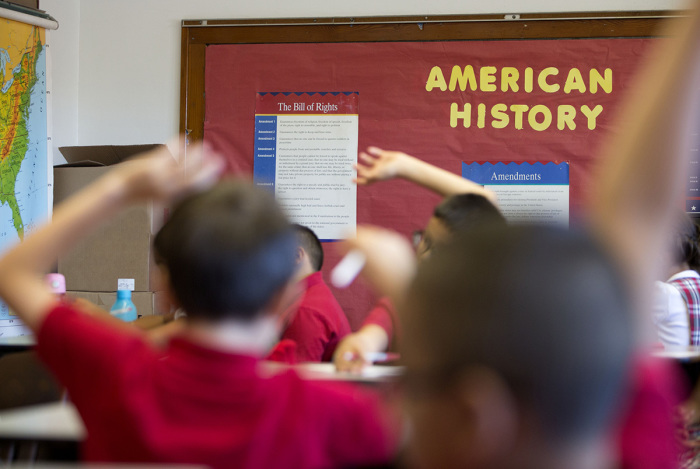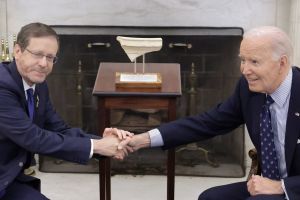Christian college's K-12 history curriculum receives pushback amid education culture wars

Correction Appended
Amid the ongoing debate over what is being taught in schools nationwide, dozens of K-12 schools are using curriculum materials designed by a conservative Christian college to offer a different approach to history lessons that critics contend gloss over darker elements of U.S. history.
Hillsdale College in Michigan is the institution behind The 1776 Curriculum, which provides history and civics lessons for K-12 classrooms.
Kathleen O'Toole, who serves as the assistant provost for K-12 Education at Hillsdale College, told The Christian Post in a Friday interview that the school's provision of curriculum and instruction materials to other educational institutions is not a new concept.
Hillsdale College, which was founded in 1844 by members of the Free Will Baptists, started its work with the K-12 grade levels in 1990, the year of Hillsdale Academy's founding. The Hillsdale Academy webpage describes it as a "private classical Christian school owned and operated by Hillsdale College."
The college is currently a non-denominational Christian school, and it has charter schools in over a dozen states as well as non-member schools that use its curriculum materials.
The 1776 Curriculum offers lesson plans that guide teachers on how to instruct students on topics related to American history and civics. The curriculum is available for free, which O'Toole said is possible due to gifts from donors, highlighting how Hillsdale does not accept any federal or state money.
The administrator said that public and Christian schools have adopted the curriculum, as well as families. She said that the idea behind the curriculum is to offer students "the truth."
"So, in classical tradition, regardless of whatever subject we're talking about, they deserve access to the truth," she said. "They deserve access to the very best, and they deserve to be treated as if they can really learn these important things without a filter."
A focus of the curriculum, she said, includes teaching students through primary source documents, helping them to uncover the evidence about historical figures and happenings for themselves.
"History is the story of the past, and the study of history is an effort to uncover the truth in the past through American history," O'Toole said.
She cited Thomas Jefferson, America's third president and the writer of "The Declaration of Independence," as an example. O'Toole called Jefferson a "puzzle," noting how he wrote "All men are created equal" in the declaration and yet, he also held slaves.
"So how do we put those two pieces of information together? That's a legitimate question to ask, and the answer lies in reading what he wrote about it," O'Toole stated. "And it's not a simple answer; it's a complicated answer. But it can be discovered if you read what he wrote and what others wrote about him at the time."
James Grossman, executive director of the American Historical Association, however, criticized Hillsdale's curriculum, alleging that the material does not properly cover topics that don't promote a patriotic view of the country.
"What they also are trying to do is replace an approach to teaching that teaches students how to think with an approach that teaches the students what to think," Grossman told NBC News in a statement earlier this month.
As the NBC report noted, schools in Pennsylvania and Florida have also taken steps to include the conservative college's approach to learning.
In Grossman's April 2023 letter to the South Dakota Board of Education Standards, AHA outlined its concerns regarding the revision of the state's social studies standards, published in March. The letter criticized the appointment of a retired Hillsdale professor to rework social studies education, accusing the school of having a "commitment to partisan politics."
The AHA executive director also questioned whether the standards were "age-appropiate" and the ability of young students to understand and explain why slavery is "morally evil" under the curriculum. Prior to the letter, the organization has previously accused the 1776 curriculum of ignoring the plight of enslaved and indigenous individuals while treating the country's founding fathers as "godlike men."
O'Toole stated that the first two units released of the 1776 Curriculum focused on America's founding and the civil war and how to reconcile the existence of slavery in a nation that declared "All men are created equal." She stressed that slavery is mentioned in the curriculum over 3,300 times and that "racism is comprehensively covered as well,"
"So that's what you will see in this curriculum; it's written with the teacher in mind. It's written with the necessities of working in a school at the forefront, and it's intended to be helpful and easy to use."
The debate about Hillsdale's curriculum comes amid multiple controversies involving parents objecting to the curriculum at their child's school, arguing that it's historically inaccurate and politically motivated.
In response to these concerns, the previous presidential administration under Donald Trump created the 1776 Commission to offer a "patriotic education" for public schools. One area of concern included the 1619 Project, which taught that the American Revolutionary War was fought over slavery and that the nation's true founding was in 1619, not 1776.
Shortly after taking office, President Joe Biden signed an executive order dissolving the commission, calling for "a comprehensive approach to advancing equity for all, including people of color and others who have been historically underserved, marginalized, and adversely affected by persistent poverty and inequality."
Correction: This article, originally published on July 31, said that Hillsdale Academy was founded in 1919 and that the 1776 curriculum mentions the topic of slavery over 3,000 times. It has been updated and corrected to clarify the date of its founding and the content of its curriculum.
Samantha Kamman is a reporter for The Christian Post. She can be reached at: samantha.kamman@christianpost.com. Follow her on Twitter: @Samantha_Kamman




























